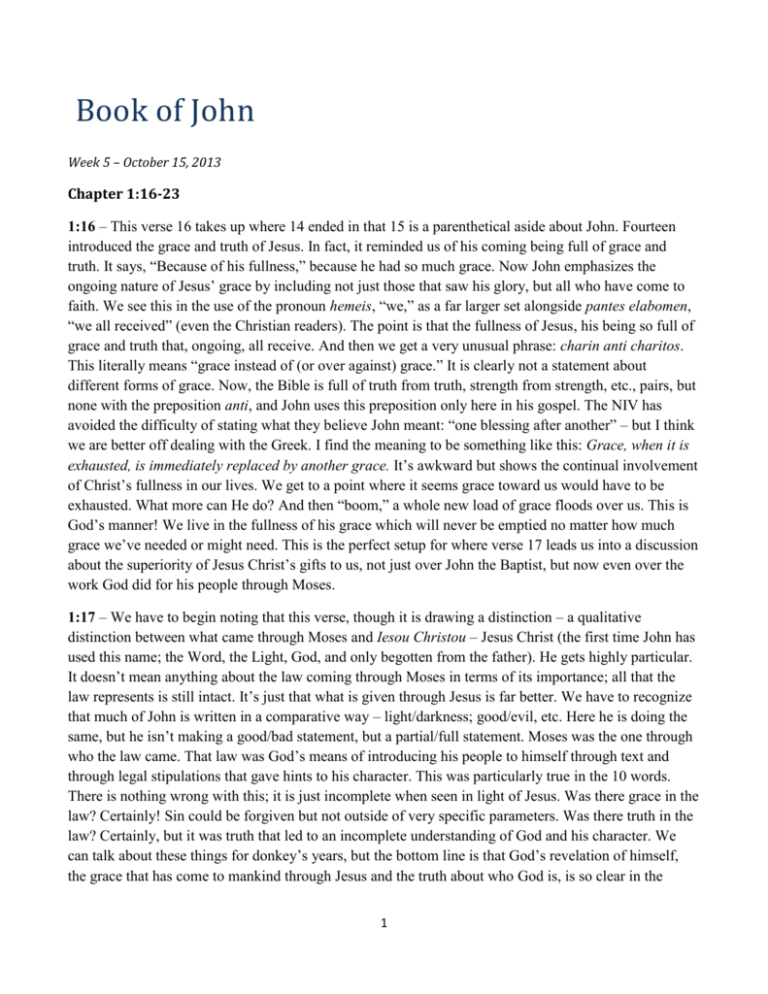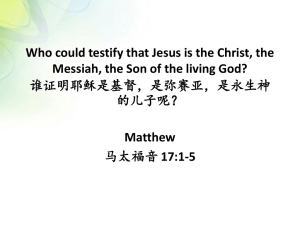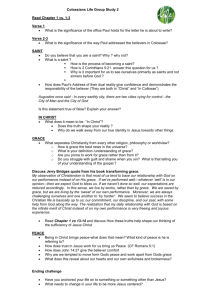Week 5 – Chapter 1:16-23
advertisement

Book of John Week 5 – October 15, 2013 Chapter 1:16-23 1:16 – This verse 16 takes up where 14 ended in that 15 is a parenthetical aside about John. Fourteen introduced the grace and truth of Jesus. In fact, it reminded us of his coming being full of grace and truth. It says, “Because of his fullness,” because he had so much grace. Now John emphasizes the ongoing nature of Jesus’ grace by including not just those that saw his glory, but all who have come to faith. We see this in the use of the pronoun hemeis, “we,” as a far larger set alongside pantes elabomen, “we all received” (even the Christian readers). The point is that the fullness of Jesus, his being so full of grace and truth that, ongoing, all receive. And then we get a very unusual phrase: charin anti charitos. This literally means “grace instead of (or over against) grace.” It is clearly not a statement about different forms of grace. Now, the Bible is full of truth from truth, strength from strength, etc., pairs, but none with the preposition anti, and John uses this preposition only here in his gospel. The NIV has avoided the difficulty of stating what they believe John meant: “one blessing after another” – but I think we are better off dealing with the Greek. I find the meaning to be something like this: Grace, when it is exhausted, is immediately replaced by another grace. It’s awkward but shows the continual involvement of Christ’s fullness in our lives. We get to a point where it seems grace toward us would have to be exhausted. What more can He do? And then “boom,” a whole new load of grace floods over us. This is God’s manner! We live in the fullness of his grace which will never be emptied no matter how much grace we’ve needed or might need. This is the perfect setup for where verse 17 leads us into a discussion about the superiority of Jesus Christ’s gifts to us, not just over John the Baptist, but now even over the work God did for his people through Moses. 1:17 – We have to begin noting that this verse, though it is drawing a distinction – a qualitative distinction between what came through Moses and Iesou Christou – Jesus Christ (the first time John has used this name; the Word, the Light, God, and only begotten from the father). He gets highly particular. It doesn’t mean anything about the law coming through Moses in terms of its importance; all that the law represents is still intact. It’s just that what is given through Jesus is far better. We have to recognize that much of John is written in a comparative way – light/darkness; good/evil, etc. Here he is doing the same, but he isn’t making a good/bad statement, but a partial/full statement. Moses was the one through who the law came. That law was God’s means of introducing his people to himself through text and through legal stipulations that gave hints to his character. This was particularly true in the 10 words. There is nothing wrong with this; it is just incomplete when seen in light of Jesus. Was there grace in the law? Certainly! Sin could be forgiven but not outside of very specific parameters. Was there truth in the law? Certainly, but it was truth that led to an incomplete understanding of God and his character. We can talk about these things for donkey’s years, but the bottom line is that God’s revelation of himself, the grace that has come to mankind through Jesus and the truth about who God is, is so clear in the 1 coming of Jesus. Here we meet God. The Messiah was far more than the Jews could have imagined. Their expectations for the Messiah were very high, as to both Jesus the Man and Jesus God himself, who would be offering grace to everyone! We should really take a step back and think about God’s grace as it worked under the law. There were sacrifices for unknown sin – sin you didn’t know you’d committed. There were also sacrifices for uncleanliness lapses – touching a multitude of things or coming into contact with things, or people or animals that had come into contact with uncleanliness. But as far as “sin of the high hand” – sin you knew you’d committed, that you did by your own volition – once a year on the Day of Atonement those sins were given grace – forgiveness. God’s grace was seen as blessing; thus, the NIV translation of charis, for the most part, grace, was a really foreign concept. His grace was connected to his long-suffering, his willingness to give time in the midst of sin to repent. Here, the fullness of God’s grace is poured out in the work of Jesus. The verse is clearly stating that while the old economy did bring forgiveness, sis extent grace, the difference is beyond comparison. We are well aware of how complete grace extended toward us is in Christ; yet, we have no idea of the difference it would be to have lived like John under both systems, or to live in a place where the two systems existed side by side. John did, and he can’t stop talking about the incredible difference that exists in the world now that grace, in its fullness, has come in the person of Jesus the Christ. It is an interesting point that both grace and truth in this verse have definitive articles: the Grace and the Truth. I don’t believe this is an accident. John was clear that the ultimate Word had come bringing the Light, and now he adds – he also brought The truth and The grace. It cannot get anymore ultimate than this! One last point: The Greek says, “through Jesus Christ, the grace and the truth became.” Not to belabor the point, but here again we find more out about the “all things” that came into existence because (or through) the Word. Grace and Truth exist at all because of Jesus. Some statement! 1:18 – And as the final verse in the prologue, John wants to reiterate all that he has previously said, and he begins with a given truth, a huge aspect of Judaism. “No one has ever seen God.” The Greek says, “God no man has seen – never.” Though we have to be careful pushing the Greek sentence structure directly into English, in this case it works. “God no man has seen. NEVER!” We get the point. Moses saw God’s back from behind a rock. That’s about as close as it ever got; otherwise, it was just in very frightening displays of God’s glory – in Exodus, at the giving of the Ten Commandments, and at the dedication of the tabernacle/temple. All of these involved Moses, and he was only allowed to see God’s back. But John wants us to recognize right here at the beginning what his gospel will be about: Jesus revealing, explaining, and making known God in a way that was unthinkable until his coming. Some Jewish sects of the day held that Moses actually was pulled into heaven to receive the law and that this encounter with God actually defied Moses in some way. This was clearly the influence of Greek thinking which held that human beings who were in the presence of a God received demi-god status. For some rabbis there would have been an argument with John, though John was simply stating what almost all ancient Jewish thinkers held. Philo, Josephus, Ben Sira all held that God was invisible and, yet, we are told Moses spoke to God face-to-face. The majority of rabbis believed that this was possible because 2 God did not fully reveal his glory to Moses. John says that’s right, but God did fully reveal his glory through Jesus. Finally, this prologue tells us once again of the close relationship between the Father and the Son. John writes “only begotten God the one being in the bosom of the Father.” This phrase, only begotten God, is odd. It would be expected to read only begotten Son, which we find in latter texts, but all of the earlier texts read “God.” John was once again returning to the God-ness of the Son and the Word was God. To speak of the Son who reveals (more later) God is a mystery. And yet, John restates it here, and he is so close, so intimate, that he is “in (or into) the bosom of the Father.” This phrase is used of Abraham’s bosom in the Lazarus story and to describe John’s close relationship with Jesus at the Last Supper. The point is intimacy – the one who is this intimate can exegeomai – explain. We get the word exegete from the Greek verb. The only begotten God who is as intimate as is possible with God the Father has explained Him. This is what the Gospel of John will be about at its core – explaining to us about God through a recollection of the words and actions of Jesus. And now we can begin the telling of John’s recollections of the good news – his gospel. 1:19-20 – We begin John’s narrative, and his telling starts with John the Baptist – much like the other gospel writers, but we get nothing of his ministry. We get his testimony about Jesus which fits well with John, the authors high Christology. Actually, his testimony isn’t about Jesus per se; he steers his testimony toward Jesus. The Greek says a delegation of Priests and Levites were sent by hoi loudaioi – the Judeans, i.e., the Jews. John alone stresses this term; he uses it 71 times in his gospel. It could be a means of stressing the difference between those from Judea and those from Galilee, but in almost all cases, John is talking about “the Jews” in negative terms referencing a small group of leaders who were opposed to Jesus. It makes sense that the same group who opposed Jesus and later opposed the Christians (the very people John was writing to) would have wanted to question John the Baptist. Later we will see that there is an almost one-to-one correspondence between the Jews and the Pharisees. But here it could simply mean the Sanhedrin, especially since the Pharisees alone could not have had the authority to send Priests and Levites on a mission of investigation – the Sanhedrin, yes, with the power of the high Priests (always a Sadducee) on their side, could. Priests were Levites. Levites in the Mishnah regulations performed two tasks (at least permanent professional Levites). (1) They were the guards at the temple, and (2) they were the musicians at the temple – always 12 playing together. Priests had to be Levites and those that weren’t properly designated as professionals had to serve in rotation at the temple. John the Baptist’s father was a Levite priest. John the Baptist would have also been trained as such, but to send a delegation of Priests and Levites (most likely strong-armed Levite guards) was unusual even though Palestine was ripe with Messianic pretenders. John the Baptist was unusual. Josephus tells us that John the Baptist drew massive crowds! This would have been unusual and warranted inspection especially from someone whose ministry did not cycle around Judea, Jerusalem or the temple. These men were sent to ask, “Who are you?” This was a legitimate question. In other words, Who do you claim to be? The normal response for a man of this stature would have been something like, I claim to be the Messiah. The Greek is odd: and he confessed and denied not and he confessed, I am not the Christ. In other words the NIV says, “He did not fail to confess but confessed freely, ‘I am not the Christ.’” He 3 was not the Messiah. This term meant “the anointed one.” Christ is adverbial for the anointed Christos – something done to prophets, high priests and kings. The Messiah (which comes from the Hebrew mashah – to anoint) was particularly expected during this time some 65 years or so following the fall of the Hasmonean Dynasty. The Messiah was thought to be political in nature, one who would overthrow the Romans and re-establish David’s thrown. John said straight up – not me. 1:21-22 – So they asked a second question: Then who are you? (implying it was odd to claim to be anyone else at this time in Israel). “Are you Elijah?” They had a number of reasons for asking this. First, John was dressed like Elijah (Zechariah 13:4 says Elijah wore a garment of haircloth and a leather girdle around his waist –he looked like him). But beyond that, Elijah did not die; he was “translated” into God’s presence in a fiery chariot. Malachi 4:5 said that the Lord would send Elijah before the great and terrible day of the Lord (which all Jews saw as the judgment of the Gentile world by the Messiah). Elijah was expected: He was expected to settle legal disputes and property issues, he had the task of getting Israel ready internally for the new kingdom and no one could deny John the Baptist’s fiery call to repentance in preparation for the Messiah. He seemed very Elijah-like in message – judgment and repentance – but John said, No. Actually, Jesus later says, Yes. My thinking is John’s humility in the face of his task was such that he wasn’t aware of his place in the plans of God; he just did what he was called to do. This answer didn’t help. They asked further, “Are you the prophet?” This would have been Moses. In Moses’ farewell address in Deuteronomy 18:15-19, he said that if they needed to know God’s will, they weren’t to go to soothsayers or diviners, but that God would raise up another prophet like Moses to tell them his will. Also, most Jews then did not believe that Moses had died. The death of Moses is an addition to the text that explains what happened post-Moses’ death. He’d gone to the mountain top alone. The thought was he, too, like Enoch before and Elijah after him, was simply taken into God’s presence, and so he could return, not from the dead but to lead his people again into the new kingdom. It is interesting that those two, Elijah and Moses, appear on the mount of transfiguration not as men raised from the dead but as men recognizable. Anyway, there was a general expectation that Moses would return and settle disputes related to the Hebrew law and Elijah would return and get things ready from a spiritual-legal angle, and then the Messiah would come and all would be in good order. John says, “I’m not Moses.” This doesn’t help either. These men have come a long way. Their “bosses” need an answer to who they are dealing with. They aren’t yet sure how to respond. His crowd-gathering ability made them nervous about Roman reaction, but his message, while rough and absolutely directed at them in many ways, sounded like the first shots across the bow for an all-out Messianic arrival. This was possibly their dream-come-true, and so these men push even harder. It says that finally, it really says “therefore, they said to him.” You can feel the exasperation. They need an answer to a simple question “Who are you?” We have to have an answer to the ones who sent us on this long trip – minimum of six days if they only spent five minutes with John. 1:23 – They ask him, “What do you say about yourself,” and his answer is a quote from Isaiah 40:3. They knew this passage. It begins with a prophetic order to comfort God’s people – comfort them with the news that God’s glory will be revealed to all the people. And in order for that to happen “the way must be made straight for the lord.” This is a loaded statement. To start with, he says he is “one calling 4 in the desert.” John was preaching in the wilderness – desert is a bit over the top. There is a difference. It isn’t something to fuss about. Wilderness had grass. Sheep could graze. Desert was without use but, still, John was a voice from a place people rarely went. To be in the desert precluded a water source for baptism. And the notion of making straight the way for the lord – Isaiah says, “Every valley raised up, every mountain and hill made low; the rough ground level, the rugged place plain.” This was in reference to what happened when kings traveled. The common people had pathways that followed the contours of the ground – narrow, curvy, up and down. This was highly dangerous for a king. Kings needed flat open roads. And the preparation for a king’s visit would often include the leveling of the high places and the filling in of the low places. This kind of preparation showed the power and prestige of a king. In this case, Isaiah says that this kind of action will take place in order to bring about the revealing of the glory of the Lord. And John’s job was to do this leveling. It wasn’t a physical leveling; it was a spiritual leveling preparing the world for the revelation of the glory of the Lord. And we’ve already seen in the prologue that God’s glory was revealed in the Son. John prepared the way, and soon the glory of the Lord would be seen. He may not have known exactly what or who was coming, but his call was to prepare the way – ready people’s hearts – and he was doing this to the full. By the way, John quotes the Septuagint not the Hebrew OT. That’s okay, but that’s why it’s different. Weekly Class Study: 1. 2. Sept. 17 - Introduction Sept. 24 – Chapter 1:1-3 3. Oct. 1 – Chapter 1:4-11 4. Oct. 8 – Chapter 1:12-15 5. Oct. 15 – Chapter 1:16-23 5









